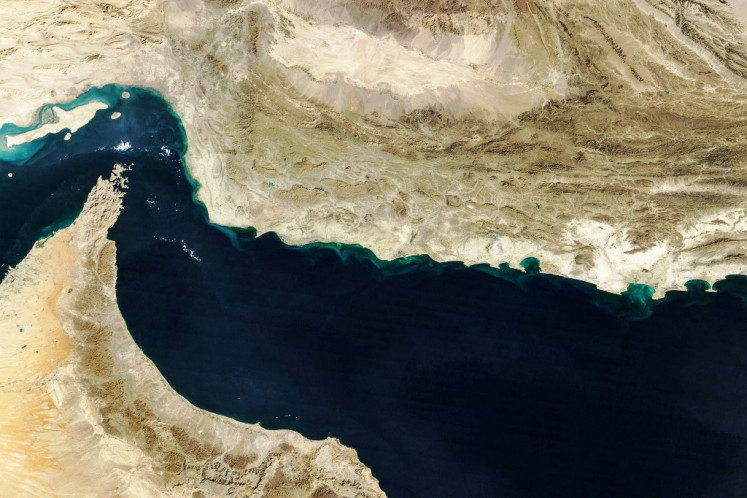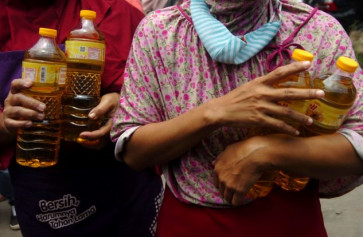Popular Reads
Top Results
Can't find what you're looking for?
View all search resultsPopular Reads
Top Results
Can't find what you're looking for?
View all search resultsTwo mothers lost their lives just for a few bottles of cooking oil
The government should not underestimate Iwan’s influence amid growing public frustration, especially as the Ramadan fasting month is about two weeks away.
Change text size
Gift Premium Articles
to Anyone
 Oiled up: Residents carry bottles of cooking oil during a market operation conducted by the Trade Ministry at the Trayeman traditional market in Tegal, Central Java, on Monday. Each household was entitled to 1.2 liters of cooking oil at a price of Rp 14,000 (98 US cents) per liter. (Antara/Oky Lukmansyah)
Oiled up: Residents carry bottles of cooking oil during a market operation conducted by the Trade Ministry at the Trayeman traditional market in Tegal, Central Java, on Monday. Each household was entitled to 1.2 liters of cooking oil at a price of Rp 14,000 (98 US cents) per liter. (Antara/Oky Lukmansyah)
“Tembak saja atau hukum seumur hidup" (Just shoot them or sentence them to life in prison), reads a line of the latest song by superstar ballad singer Iwan Falls. The song calls on the government to severely punish heartless businesspeople for hoarding cooking oil for their own profit and greedy palm oil producers for not caring about the suffering of millions of people.
Rita Riyani, a 49-year-old housewife, died on Tuesday after being hospitalized for two days in Samarinda, East Kalimantan. She collapsed on Sunday after waiting in line for cooking oil for hours. The resident of the Air Putih subdistrict was too exhausted.
Just two days before President Joko “Jokowi” Widodo's visit to the site of the new capital city Nusantara, also in East Kalimantan, on Monday, another housewife, Sandra, 41, collapsed and died as soon as she arrived at a packed minimarket in Kampung Cina in Berau regency, also in East Kalimantan, to buy cooking oil. Dozens of other buyers had already thronged the minimarket.
Sandra’s husband had asked her to stay at home because she was sick. But she insisted on going to the minimarket because it was difficult to find cooking oil elsewhere.
The cooking oil scarcity all over the country has pushed the legendary singer Iwan, born Virgiawan Listanto, to come back with his “rebellious” trademark that catapulted him to fame. He is prominently known for his hits such as "Bento, Bongkar" (Demolish) and "Serdadu" (Soldier), which were played as “anthems” by street demonstrators in their mass protests against Soeharto’s dictatorship since a few years before his fall from grace on May 21, 1998.
Just a few days ago Iwan released his new song "Minyak Goreng" (Cooking Oil), which he composed along with Raja Pane. The song has gone viral on social media platforms. Iwan, who is often dubbed Indonesia’s Bob Dylan, has regained his old nature as a sharp government critic who could not accept the state lost to the powerful businesses.
Iwan points his finger at seven major palm oil producers, which he describes as seven conglomerates. It is actually more complicated than it may seem because the palm oil industry has also become a revenue source of many government officials, including ministers and politicians.


















